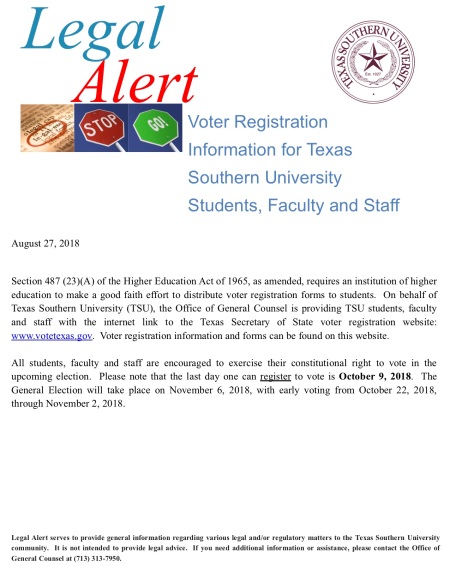Syllabus: Advanced Reporting JOUR 332
Michael.Berryhill@tsu.edu
713-313-7528
Office Hours, MLK 231
T&Th: 10-11 and 1:30-3
Thursday 1-2
And by appointment.
To a certain extent, every syllabus is a work in progress. This syllabus is even more so. Here’s why: This class requires almost constant changes and additions. This is journalism. We are concerned about developing events. We’re not sure exactly what’s going to transpire. But, we’ll need to be ready.
Introduction to Reporting is taught by Michael Berryhill. I have been the chair of journalism at TSU since fall 2010. Before that I taught for four years at the University of Houston. Before that I spent 25 years as a writer and editor for Texas newspapers and magazines, including the Houston Press, the Houston Chronicle, the Fort Worth Star-Telegram, D Magazine, Houston City Magazine and Texas Parks and Wildlife Magazine. I am also the author of a book that came out in October 2011 from the University of Texas Press: The Trials of Eroy Brown: The Murder Case that Shook the Texas Prison System. My blog about the book is: http://www.trialsoferoybrown.com/
I am also working with Dr. Tyrone Dixon of TSU on a theatrical film and documentary film treatments of the book.
My specialty is long-form journalism: that is, magazine length features and investigative journalism. Most recently I published a 9,000 word story about Neighborhood Centers and its $300 million program to help the immigrant community. It’s at https://placesjournal.org/article/houstons-quiet-revolution/
As of now, here are some of the things you can expect during the semester:
Class Blogs
No textbook is required for the course. Instead I have created a blog with instructional pages on the right-hand side of the home page. The blog is located at https://tsuadvancedreporting.wordpress.com/
Go to the blog and find the follow button and subscribe to the blog. Each time I make a post you should receive an email message.
I will be posting assignments, story links and so forth on his page. Please read the blog and keep up with it.
You must create a class blog for this class on which you will post your stories. This blog can then be used as a professional portfolio. Make the blog in WordPress because it links more readily to the class blog. You might consider buying a domain name.
Master the Basic Story Form
One of the primary goals for this class is that you master the basic story form. I will be emphasizing this again and again. The basic story form is posted in the right-hand column under “Pages.” Read the Basic Story Opening as well.
You must write stories that demonstrate mastery of the basic story form, including the correct punctuation of quotations.
Writing Requirements
You must post at least six acceptably written stories to pass the course with a C. More will result in a better grade. I hope that some of these stories will be good enough to run in the Herald.
As you know, this class has a lab requirement. However, other than the class itself, we won’t be meeting formally in a lab setting. All the things we will be doing will be in keeping with fulfilling that requirement.
I will be bringing guests to class for you to interview and write about. You must be present for these interviews. You must also learn to take notes and turn the story around. You may use a recorder, but you must also take notes.
I will be emphasizing classroom writing. Reporters seldom conduct an interview and turn the story in three weeks later.
The class is set up in such a way as to allow you to get a feel for what it means to be a reporter. In that sense, this isn’t a traditional lecture class or a class that relies on class discussion. On the other hand, I will expect a certain level of performance from you that we think compares to what you might expect in a work situation. During the semester we’ll work on attributes that will give you an advantage once you do go to work professionally.
If you feel you are weak on matters of grammar, punctuation and style, consult the pages, and Notes on Editing. In addition, I plan on setting up a writing lab in which you can get extra help.
What I Expect From You
A class like this works only as well as the members of the class make it work. In that regard, here are some expectations
Come to class and be here on time. This isn’t the kind of class that you should miss. Arrange your schedule in such a way that you will be able to be here. When something comes up, talk to me about it or send me an email. And be on time.
No matter what the circumstances, you are always responsible for what goes on in class – including assignments. You should find a buddy to help you in times of need. Not knowing what we are doing is not an acceptable excuse.
Do well on all the assignments, and follow up on things I ask you to do. And do it with a good attitude. Attitude is very important in reporting, and you need to have a positive, outgoing attitude toward me, toward the class, toward everyone with whom you deal.
What will set you apart will be coming up with other stories you can do in addition to those, you may have been assigned.
Get Organized
Get the right supplies. You’ll need notebooks. Have a notebook for class and get in the habit of taking notes in it. That can be your record of what you have done for the class. You’ll need a reporter’s notebook or any other notebook for taking notes when you are working on stories. And, I’d suggest a small notebook that you can use to remind yourself of when things are due.
If you don’t have a recorder and aren’t familiar with using one, this is the time to get one and start using it. But don’t let the recorder substitute for taking notes. You must take notes as well.
Keeping Up With The News
There will be weekly quizzes on current events on Tuesdays. You will want to do well on these. We will keep up with international, national, regional and local stories. We will keep up with what’s happening at TSU.
Subscribe to the free New York Times and Washington Post email feeds. Read the local papers that cover the African American community. Subscribe to university e-mail newsletters when possible. Especially follow local events. Become familiar with who’s who in the Houston area.
Subscribe to theSkim: http://www.theskimm.com
Browse Twitter accounts that post interesting reading. The Internet is vast. How do you find out what’s out there? By following trusted people.
Listen to and watch all the news you can. When possible, listen to NPR on KUHF (88.7) in the morning and afternoon. If you can, listen to Democracy Now at 9 a.m. on KPFT (90.1) Catch “Tell Me More” with Michelle Martin 8-9 on KTSU (90.9). Watch the news on television when you can. If possible, listen to the network news at 5:30 and to the local news at 6 and 10. Also, watch CNN in the student lounge areas.
Read news on the Internet. Learn how to set up an RSS feed.
One of the reasons for doing all this is so that you can recognize what constitutes news, where it comes from and how it is handled. This takes time and you need to get started on that now.
Also, we are constantly looking for stories that might be of interest to students or have a Texas Southern connection.
I will be particularly pleased with stories that are well written enough to be included in the School of Communication newsletter and website.
Class goals and learning objectives:
Demonstrate knowledge of the three-paragraph opening
Write a lead with action verbs
Set the story in time and place
Correctly attribute, punctuate and capitalize a quotation.
Correctly handle fundamentals of style
Demonstrate interviewing and note taking skills by writing stories
Demonstrate digital technology skills by blogging
The best way to reach me is by email at Michael.Berryhill@tsu.edu. My office number is 713-313-7528. But I prefer email.
I think you will enjoy the class and everything we will be doing. I think you will learn a great deal and look back on the experience fondly. I’m looking forward to working with you, and wish you the best of luck.
Michael Berryhill

